UL Certifications for Battery Systems: A Complete Guide
Battery Energy Storage Systems (BESS) are becoming essential in today’s energy landscape. Whether for renewable integration, grid stability, or backup power, ensuring the safety and reliability of these systems is critical. This is where UL certifications for battery systems play a crucial role.
UL (Underwriters Laboratories) is one of the most trusted global safety certification organizations. Its standards verify that battery energy storage systems meet strict safety, fire prevention, and performance requirements. For project developers, manufacturers, and operators, understanding these certifications is not optional—it’s necessary.
In this guide, we’ll explore key UL standards such as UL 9540, UL 9540A, UL 1973, and others. You’ll also learn how these certifications impact compliance, insurance, and deployment.
At Sunlith Energy, we help businesses navigate energy storage safety and compliance while building reliable battery solutions.
Why UL Certifications Matter for Battery Energy Storage
1. Safety and Risk Mitigation
Battery systems, if not designed properly, can pose fire hazards or thermal runaway risks. UL standards ensure that systems undergo rigorous testing to minimize these risks.
2. Regulatory Approval
Most jurisdictions require UL-certified equipment for permitting. Without it, projects can face delays, redesigns, or rejection.
3. Market Trust and Bankability
Investors, insurers, and end-users trust certified systems. A BESS with UL certifications demonstrates credibility and long-term reliability.
👉 Related Read: Complete Guide to Battery Energy Storage Certification
Key UL Certifications for Battery Systems
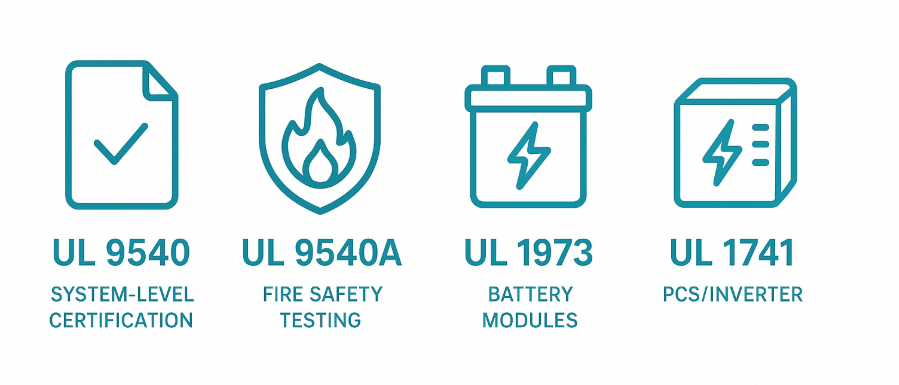
UL 9540 – Standard for Energy Storage Systems and Equipment
UL 9540 is the primary certification for energy storage systems. It evaluates the safety, performance, and construction of complete systems, not just individual components.
- Covers batteries, Power Conversion Systems (PCS), control systems, and enclosures.
- Required for grid-scale, commercial, and residential BESS installations.
- Ensures systems meet fire safety and electrical safety standards.
Why it matters: Without UL 9540, your BESS may not receive local authority approval.
👉 Learn more about Energy Storage PCS and how it integrates into certified systems.
UL 9540A – Test Method for Evaluating Thermal Runaway Fire Propagation
UL 9540A is not a certification itself but a test method. It assesses how thermal runaway in one cell can propagate through modules, units, and installations.
- Provides data on fire propagation and suppression.
- Often required by fire marshals and building authorities.
- Supports UL 9540 certification by demonstrating safe design.
👉 Explore our article: UL 9540A Test Method Explained
UL 1973 – Batteries for Use in Stationary and Vehicle Auxiliary Power Applications
UL 1973 focuses on individual battery modules and packs used in stationary systems.
- Tests electrical, mechanical, and environmental safety.
- Covers BESS, telecom backup, and EV auxiliary batteries.
- Often a prerequisite before seeking UL 9540 certification.
UL 1741 – Inverters, Converters, Controllers
Since BESS includes PCS (Power Conversion Systems), UL 1741 applies to inverters and related power electronics.
- Validates PCS for interconnection safety with the grid.
- Ensures compatibility with renewable energy and microgrids.
- Critical for hybrid solar + storage projects.
👉 Read our guide: PCS vs Inverter – Key Differences
UL 1974 – Evaluation for Repurposing Batteries
As second-life batteries become more common, UL 1974 helps ensure repurposed cells are safe for reuse.
- Evaluates used EV or industrial batteries for BESS applications.
- Supports sustainability by extending battery life.
- Ensures recycled batteries meet minimum safety standards.
Benefits of UL-Certified Battery Systems
- Regulatory Compliance – Smooth project approvals and grid interconnection.
- Enhanced Safety – Reduced risk of fire, explosion, and system failure.
- Market Acceptance – Easier financing and insurance.
- Long-Term Reliability – Certified systems undergo rigorous life-cycle testing.
- Future-Proofing – UL standards evolve with technology, ensuring systems stay relevant.
Challenges in Achieving UL Certification
- Cost and Time: Certification requires extensive testing, which can delay projects.
- Design Changes: If a component fails testing, redesign may be necessary.
- Complex Standards: Navigating multiple UL standards can overwhelm new manufacturers.
This is where industry partners like Sunlith Energy provide support—helping companies design systems aligned with certification requirements from day one.
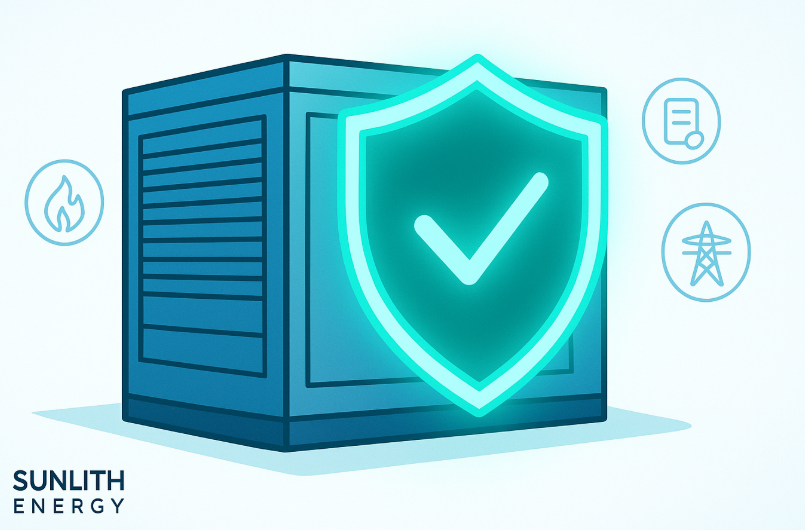
How Sunlith Energy Helps with UL-Compliant Solutions
At Sunlith Energy, we ensure that every battery system we design aligns with UL safety and certification standards. Our approach includes:
- Design Consulting: Guiding OEMs and EPCs on compliance from the design phase.
- Testing Support: Preparing systems for UL 9540, UL 9540A, and UL 1973 evaluations.
- End-to-End Solutions: Delivering certified-ready BESS with integrated PCS, battery modules, and fire safety systems.
Whether you’re deploying grid-scale storage, C&I projects, or hybrid solar + storage, our certified solutions meet the highest safety benchmarks.
👉 Learn more about our Battery Energy Storage Systems
FAQs on UL Certifications for Battery Systems
1. What is UL certification for battery systems?
It is a safety and performance evaluation that ensures battery energy storage systems meet global standards for fire safety, electrical reliability, and environmental resilience.
2. Do all BESS need UL 9540 certification?
Yes. For commercial and residential deployment in most regions, UL 9540 is mandatory.
4. How long does certification take?
Depending on system complexity, UL certification can take 6–12 months.
5. Can second-life batteries be certified?
Yes, through UL 1974, which evaluates repurposed batteries for safe use in stationary storage.
Conclusion
UL certifications for battery systems are the foundation of safe, compliant, and bankable energy storage projects. From UL 9540 system-level approvals to UL 9540A fire safety testing and UL 1973 battery-level compliance, these standards ensure that energy storage systems perform reliably under real-world conditions.
As energy storage adoption accelerates, ensuring compliance with UL standards will not just be a regulatory requirement—it will be a competitive advantage.
At Sunlith Energy, we’re committed to helping businesses deploy safe, certified, and future-ready energy storage systems.


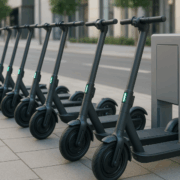
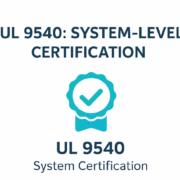
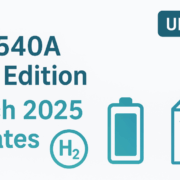
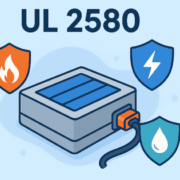
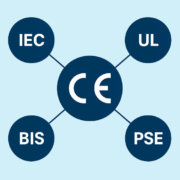
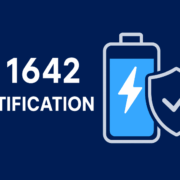
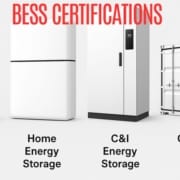
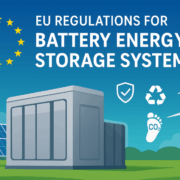


Trackbacks & Pingbacks
[…] In practice, these rules align with UL Certifications for Battery Systems. […]
[…] For full compliance, performance testing should be aligned with system-level safety certification, such as UL Certifications for Battery Systems. […]
[…] Certified BESS design under UL Certifications for Battery Systems […]
[…] 🔗 Read More about UL Certifications for BESS: Learn more about UL Certifications for Battery Systems → […]
[…] how UL Certifications for Battery Systems already help ensure safety and traceability in energy […]
[…] This blog explains what UL 2580 covers, why it’s important, and how it differs from other UL certifications. […]
[…] Many warranties and incentives, like those tied to UL Certifications for Battery Systems, require professional installation to remain […]
[…] terms are often used together, they play very different roles in certification and safety testing. UL 9540 is a system-level certification that validates the overall safety of an energy storage syste…. In contrast, UL 9540A is a test method that evaluates fire risks, specifically thermal runaway and […]
[…] 👉 Related: UL Certifications for Battery Systems […]
Leave a Reply
Want to join the discussion?Feel free to contribute!